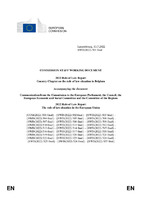| dc.description | RECOMMENDATIONS In addition to recalling the commitments made under the national Recovery and Resilience Plan relating to certain aspects of the justice system, it is recommended to Belgium to: • Continue measures to provide adequate human and financial resources for the justice system as a whole, taking into account European standards on resources for the justice system. • Complete the legislative reform on lobbying, establishing a framework including a transparency register and a legislative footprint, covering both members of Parliament and Government. • Strengthen the integrity framework, including by adopting a Code of Conduct covering all members of ministerial private offices, rules on gifts and benefits for members of Parliament and Government and rules on revolving doors for government and their private offices. • Strengthen the framework for access to official documents, in particular by improving request and appeal processes and by limiting the grounds for rejection of disclosure requests, taking into account European standards on access to official documents |
| dc.description.abstract | Concrete and comprehensive initiatives are ongoing to increase significantly the level of
digitalisation of the Belgian justice system by 2026. Further steps are being taken towards the
transfer of judicial management powers from the executive to the judiciary. The High Council
for Justice continues its efforts to improve the independence, quality, and efficiency of the
justice system, in particular by conducting audits and issuing opinions on draft legislation. The
lack of human and financial resources remains a challenge for the justice system, but significant
investments and initiatives aim to address this. A persistent lack of court data still hampers
progress on the efficiency of justice, but initiatives are ongoing to remedy this issue. While
additional human resources are being granted to help address backlogs, particularly lengthy
delays reported in certain courts remain a source of concern.
Although aspects related to corruption are included in the national security strategy and
different action plans, as well as multiple coordination platforms, Belgium has no specific
overarching anti-corruption strategy. The situation at the Central Office for the Repression of
Corruption has improved, including in terms of results in high-level corruption cases, however,
its resources continue to be overall limited. Generally, there is good compliance with the
requirement to declare assets and mandates, however, the verification and transparency of such
declarations remains an issue of concern. The system to report potential foreign bribery cases
is in place but obstacles to the successful prosecution of such cases include the statute of
limitations, a lack of prioritisation of cases, and difficulties to obtain evidence. Mainstreaming
integrity rules in the police is a challenge, with each police zone having its own rules. A broad
integrity policy for Ministers, their Cabinets and as well as members of Parliament remains
lacking and existing codes of conduct continue to have gaps. There are no clear and consistent
rules in place on how to deal with gifts and benefits for Parliament and Government. Initial
steps were taken towards a reform of the legislative framework regarding lobbying, and a
reform of the legislation on whistleblowing is ongoing. Gaps continue to exist in the rules on
revolving doors, in particular relating to their scope and to a lack of transitory measures.
A robust legal framework and independent media regulators continue to ensure media
pluralism. Specific safeguards for the governance and the operational and editorial
independence of the public service broadcasters guarantee their autonomy and impartiality.
The media markets of the three linguistic Communities remain highly concentrated. Recent
legislation introducing new refusal grounds, and delays in treating public document requests
might affect the right to access public documents. Cases of physical or verbal abuse as well as
online and offline threats are an increasing source of concern for journalists. While there are
sporadic reports about police officers seizing and erasing journalistic material, recent
jurisprudence has brought clarity about the possibility for journalists to film police
interventions and courts enforce robust legal safeguards.
The Council of State and the Constitutional Court, as well as other independent institutions
with an important role in the system of checks and balances, face some challenges regarding
resources, but certain steps are being taken to address this. The pandemic law that provided a
new legal basis for pandemic emergency measures was deactivated in March 2022, and the
Constitutional Court will rule on its constitutionality. Civil society is being regularly involved
in Government initiatives, but a certain narrowing of the civil society landscape has been
reported. A citizen consultation process was held on the preparation of a future State reform. |

